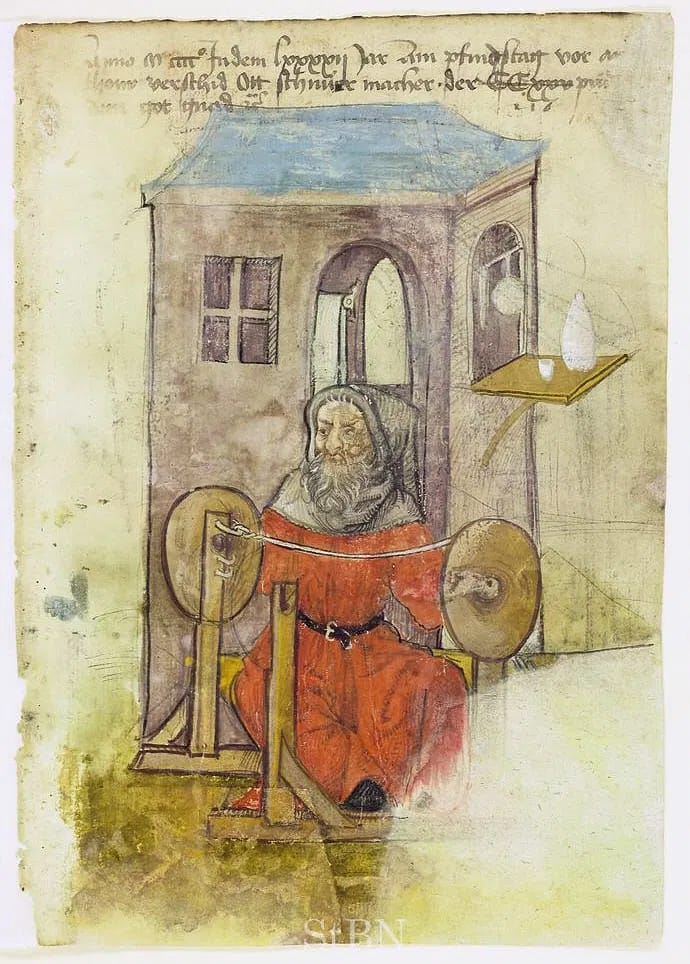Welcome to Thursday Things! If you enjoy this edition, please click the heart icon in the header or at the end of the post to let me know.
Is it time for lunch yet? Photo by Céline Druguet on Unsplash
Medieval Jobs
Do we need another depressing list of jobs and occupations that will probably go away because of AI? No.
Do we need an illustrated listicle of medieval jobs? Yes! Yes, we do.
Knights will always need armor, so I’ve got total job security! Source: House Books of the Nuremberg Twelve Brothers Foundation, via Medievalists.net
Want to know what kind of jobs there were in the Middle Ages? A unique source from the 15th century gives us some beautiful images of medieval people at work.
Known as the House Books of the Nuremberg Twelve Brothers Foundation, these were records of a charitable foundation started in the German city of Nuremberg in 1388. The foundation would assist poor and needy people by providing them with training to work in a trade.
Starting around 1425 their books would contain one-page illustrations of the people they had helped, usually giving their names and a short description of when they lived and what they were doing. Here are forty examples of medieval jobs from the 15th and early 16th centuries.
And here are the top five jobs from the list:
Butcher: “Butchers would be needed to prepare meat for many customers, but their profession was one that created a lot of smell and waste, leading towns to regulate where they could practice this trade.”
Baker: “Bakers were often heavily regulated in the Middle Ages, with authorities making sure their products could even be bought by the poorest people.”
Stonemason:1 “Stonemasons would prepare the materials for construction, whether it be houses, walls or churches.”
Weaver: “The making of clothing required several professions during the Middle Ages, such as the weaving of thread into cloth.”
Winemaker: “This specialized type of farming was needed to produce wine.”
Also on the list — Farmer, Painter, Messenger, Ropemaker, Farrier, and many more
Do click through and enjoy the fantastic illustrations!
What most strikes me about this list is that most of these “medieval jobs” still exist!
And most of them, I think, will continue to exist, AI or no AI.
Might want to brush up on your mad medieval skills.
Ropemaker, ropemaker, make me a rope! Source: House Books of the Nuremberg Twelve Brothers Foundation, via Medievalists.net
Digital oblivion
While there are many advantages to having the world’s information available in digital form, one drawback is that digital media are vulnerable to loss in ways that physical media are not. Sure, film fades and deteriorates. Books and paper documents can be lost to fire, mold, decay, or simply being misplaces. Records get scratched, cassettes (remember those?) break, and so on. Bits and pieces of history get lost this way every day, whether you’re talking personal and family history, cultural history, or history writ large.
Our first impulse may be to think “Ah! But if we digitize things, they’re safe forever on the internet!” Certainly here at Thursday Things we’re big fans of digital online collections of old maps, drawings, photos, books, articles, magazines, films, and so on. The internet give us amazing access to records and literary works and art and historic documents that we might never see otherwise.
But…
Digital files are also highly susceptible to being censored, locked up behind passwords and paywalls, or simply deleted. You can lose access to your online accounts — along with all the associated emails, photos, tweets, posts, videos, etc. — for a variety of reasons, many of them beyond your control. And what happens to the files and accounts of people who die, to their digital legacy that may be secured behind passwords they took to the grave? Websites go out of business, formats become obsolete. There are many ways for data to die.
It’s the paradox of digital — simultaneously a way to preserve information forever (or at least for a very long time) and a medium that can send that same information to oblivion. We’re probably losing the equivalent of the ancient Library of Alexandria every day.2
Or, as this article puts it: The internet’s memory is fading in front of us. Preserve what you can. The article reports how Google, Twitter, Facebook, and something called Imgur have all announced policies that could lead to the deletion of what they consider “dormant” accounts.
What then is to be done? The Internet Archive, with its Wayback Machine, does admirable work in preserving digital history.3 But what can you do?
The article has a few good suggestions:
1. Save bits of the web: If you’ve landed on a website with an image you’d like to hang on to, right-click it — or long-press, if you’re using your phone — and save it. (Since not all websites allow this, you may need to take a screenshot instead.)
2. Back up your devices: Always a good idea!
3. Don’t just rely on the cloud: The cloud is just someone else’s computer.
4. Download those tweets: It’s not entirely clear when — or even if — Twitter will really start deleting people’s old, unused profiles. If the idea of someone’s profile vanishing fills you with dread, there are steps you can take to make sure those tweets and images continue to live on somewhere.
5. Archive voice mails: There are several ways to do this.
Read the article for details. How much of your “digital existence” is safely backed up?
Thank you for reading!
Please click the hearts, leave a comment, and use the share feature to send this issue to a friend who might enjoy it. See you next Thursday!
Yeah, I was expecting candlestick maker next too. But it didn’t make the list.
I just made that part up, but it sounds serious, doesn’t it? If you read the linked article, you’ll see the author quoted a similar thought.
“Internet Archive is a non-profit library of millions of free books, movies, software, music, websites, and more.”





